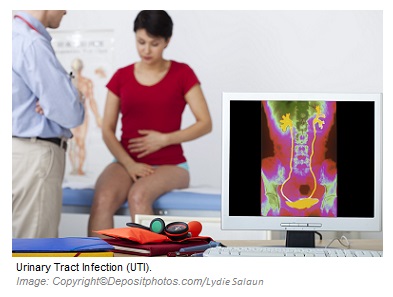
respiratory tract infections. UTI can affect either the upper parts of urinary tract, such as kidneys and ureters, which is called upper UTI, or the lower parts of urinary tract, such as bladder and urethra, which is called lower UTI.
Cystitis (infection of bladder) and urethritis (infection of urethra) are lower UTIs, and pyelonephritis (kidney infection) is an upper UTI.
Lower UTIs are more common but less dangerous, and upper UTIs are less common but more dangerous. Most infections are of ascending type. UTIs are more common in females than males.
Cystitis is infection of the bladder caused by a bacteria, virus, or unknown reason. The most common cause is a bacterium known as “E.Coli”. Interstitial cystitis is inflammation and irritation of the bladder without infection and it is also called “painful bladder syndrome”.
Pyelonephritis is infection of the kidney.
Signs and symptoms of UTIs vary and they are an increased urinary frequency, urgency, dysuria (burning and pain on urination), lower abdominal discomfort, chronic pelvic pain, changes in urine color, fever, and generalized malaise.
Potential risk factors for UTIs are:
- Female sex.
- Urinary tract obstruction.
- Urinary reflux.
- Stones.
- Pregnancy.
- Elderly people.
- Instrumentation and urinary catheterization.
- Diabetes mellitus.
- Immunosuppression.
- Stress.
- Long term use of antibiotics.
- Urinary tract injury.
- Sexual intercourse
- Hormonal changes.
- Abnormal anatomy of the urinary tract.
- Use of a diaphragm for contraception.
- Poor diet.
- Food allergies.
Nutritional Supports:
Restricted Foods:
- Sugars, refined sugars and sweets. They weaken the immune system and increase risk of infection.
- Saturated fats.
- Trans-fats.
- Processed foods.
- Fried foods.
- Salty foods.
- Spicy foods.
- Allergenic foods.
- Alcohol and coffee.
- Additives, preservatives, and food colorings.
- MSG (monosodium glutamate)-containing foods.
- Sodas.
Recommended Foods:
- Drink plenty of water: at least 2 liters a day.
- Fruits and vegetables: 8-10 servings.
- Cranberry juice: it prevents bacteria from attaching to the linings of the urinary tracts.
- Blueberry juice.
- Juniper berries.
- Garlic.
- Onion.
- Fruits with a diuretic effect: cranberries, watermelon, lemon, pineapple, kiwi, cantaloupe, papaya, figs, mangoes, grapes and strawberries.
- Vegetables with a diuretic effect: cucumber, celery, parsley, asparagus, mustard greens, cilantro, lettuce and watercress.
Recommended Supplements:
- Cranberry Extract: 1000 mg a day. Cranberry prevents bacteria from attaching to the urinary tract membranes.
- Uva Ursi: as a capsule 500 – 1000 mg a day, as a tincture 10 – 15 ml a day, or as dried leaves in the form of tea 2 – 4 grams a day. Uva ursi contains “arbutin” and it converts in the body into hydroquinone, which is a potent anti-bacterial. Caution: this product is not recommended during pregnancy.
- Vitamin C: 2 – 4 grams a day.
- D – Mannose: 1000 – 2000 mg a day. D-mannose inhibits bacterial adhesion.
- Goldenseal Extract: 500 – 1000 mg day. This herb contains “berberine”, which is a strong anti-bacterial. Caution: this product is not recommended during pregnancy.
- Horsetail: as a capsule 1000 – 2000 mg a day, or as a tincture 4 – 8 ml a day.
- Oregano Extract: 1000 – 2000 mg a day.
- Potassium Citrate: 250 – 500 mg day. This product alkalinizes urine and is often used for temporary relief during acute phase.
- French Maritime Pine Bark Extract: 100 – 200 mg a day.
- Grape Seed Extract: 50 – 100 mg a day.
- Aloe Vera Juice (for interstitial cystitis): ¼ to ½ cup three times a day.
- Gotu Kola Extract (for interstitial cystitis): 60 – 120 mg a day.
- Digestive Enzymes: A broad spectrum product.
- Probiotics: A product that provides 5 to 10 billion active organisms per serving.
- Multivitamins – Multiminerals: A high potency product.
Miscellaneous Suggestions:
- Liver detoxification (for chronic interstitial cystitis).
- Colon cleansing (for chronic interstitial cystitis).

